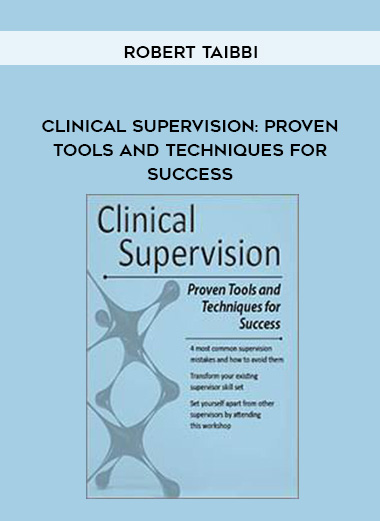CLINICAL SUPERVISION: PROVEN TOOLS AND TECHNIQUES FOR SUCCESS – ROBERT TAIBBI
Welcome to the world of supervision. As a clinical supervisor, you’re part mentor, part administrator, part parent, part advocate, part den mother…
You’re pulled in every direction, yet feel stuck in the middle between those you supervise and the administrative higher-ups. You’re an advocate for staff needs, responsible for creating good staff morale, but also responsible for the quality of services. With so many hats on your head, how do you keep it all in balance?
The ultimate mystery of clinical supervision is figuring out how to help people not just be competent and compassionate, but help them weave together their strengths, skills, and personalities into a unique clinical style that gets the best results.
In my 40 years of clinical and supervisory experience, I’ve learned the ins and outs of supervision – and I’m excited to share this insight with you in a new online course, Clinical Supervision: Proven Tools and Techniques for Success.
This comprehensive course will get you thinking like a supervisor and using your clinical skills to both challenge and support staff while ensuring quality control.
GET CLINICAL SUPERVISION: PROVEN TOOLS AND TECHNIQUES FOR SUCCESS OF AUTHOR ROBERT TAIBBI
Here’s a snapshot of what this course covers:
Core Concepts
- Challenges of clinical supervision
- Models of supervision – Clinical, role, developmental
- Anxiety management, attachment styles, & learning styles
- Learning problems vs. problems about learning
- Relationship triangle & guided imagery exercise
- The Big Six- What to do when you get stuck
- Parallel process & leadership styles
- Covey time management – 4 ways of organizing time/tasks
4 Stages of Professional Development: Characteristics, Tasks, & Dangers
- Stage 1: Supervisor as teacher
- Stage 2: Supervisor as guide
- Stage 3: Supervisor as gatekeeper
- Stage 4: Supervisor as consultant
Assessment of the Clinician & Development
of Supervisory Plans
- Stage of development
- Clinician skills
- Supervisory relationship
- Anxiety coping style
Ethics, Liability, & Recordkeeping
- Essential ethical guidelines national organizations
- Liability/legal issues: records, child abuse & custody, advertising, subpoenas, testimony, licensure
- Supervision vs. Consultation
- Accountability/liability issues
Methods of Clinical Training
- Group supervision – types & processes
- Challenges of new supervisors
- Role of students/interns
- Experiential techniques – Live observations, co-therapy, & roleplaying
- Supervisor/clinical documentation, staff evaluations
Management Issues
- Handling problem employees
- Effective disciplinary process
- Hiring & firing guidelines
The 4 Supervisory Mistakes You Never Want to Make, and How to Avoid Them
- Spoon-feeding
- Focus on client rather than clinician
- Ignoring parallel process
- Unclear supervisory goals; unaware of stage of clinician development





